Posts Tagged ‘Nationwide Ceasefire Coordination Team’ (30 found)
Another Year Passes in the War Against the Kachin, the International Community Must Pressure the Burma Government
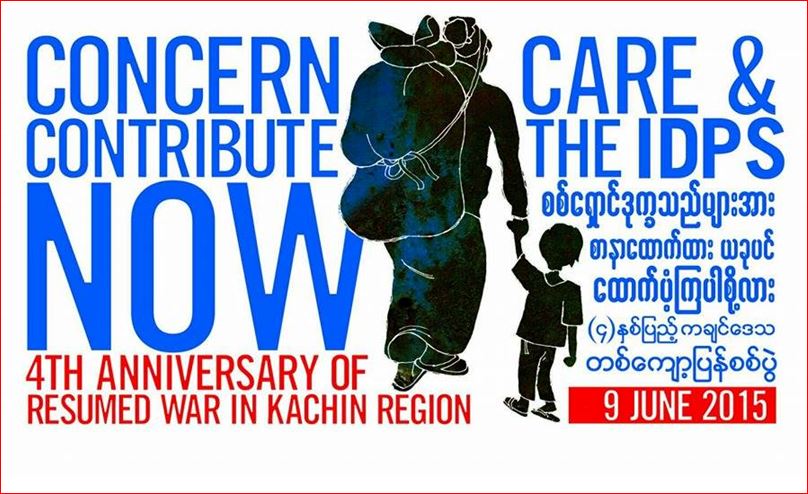 On 9 June 2015, the latest summit of ethnic armed organizations (EAOs) concluded in Law Khee Lar, Karen State. On the very same day four years ago, Burma Army broke its 17-year-old ceasefire agreement with the Kachin Independence Army (KIA), and launched a relentless offensive in Kachin and northern Shan State. As EAOs, including the KIA, were reaffirming their unity, organizations around the world displayed solidarity with those suffering from this four year war, calling for conflict to end, and humanitarian aid to be delivered to over 120,000 displaced by this bloody and ruthless war […]
On 9 June 2015, the latest summit of ethnic armed organizations (EAOs) concluded in Law Khee Lar, Karen State. On the very same day four years ago, Burma Army broke its 17-year-old ceasefire agreement with the Kachin Independence Army (KIA), and launched a relentless offensive in Kachin and northern Shan State. As EAOs, including the KIA, were reaffirming their unity, organizations around the world displayed solidarity with those suffering from this four year war, calling for conflict to end, and humanitarian aid to be delivered to over 120,000 displaced by this bloody and ruthless war […]
Ethnic Armed Resistance Organizations Reaffirm Unity at Law Khee Lar
On 2-9 June, the Ethnic Armed Organizations (EAOs) held a Summit hosted by the Karen National Union (KNU) in Law Khee Lar, Karen State to discuss the draft of the Nationwide Ceasefire Agreement, which was finalized on 30 March 2015 by the Nationwide Ceasefire Coordination Team (NCCT) and the Union Peacemaking Work Committee (UPWC).The Summit reviewed the NCA draft, but there are still remaining points to be negotiated […]
• • •Ethnic Leader Demands Prisoner Releases
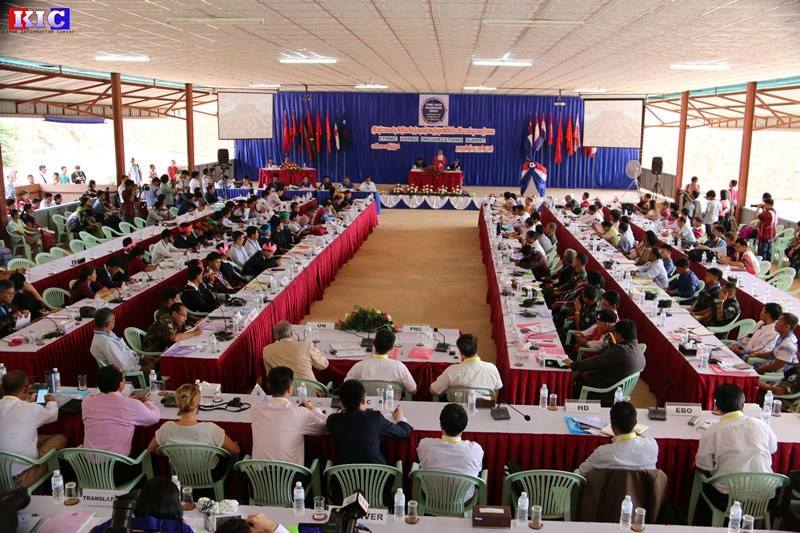 The chairman of the Pa-O National Liberation Organisation Khun Myint Tun said that the release of prisoners would be negotiated with the government before signing the nationwide ceasefire agreement […]
The chairman of the Pa-O National Liberation Organisation Khun Myint Tun said that the release of prisoners would be negotiated with the government before signing the nationwide ceasefire agreement […]
Ethnic Armed Organizations’ Summit Statement Law Khee Lar, Karen State, 2-9 June 2015
The Summit of the Ethnic Armed Organizations’ top leaders was held successfully at the KNU Headquarters’ Law Khee Lar Camp in Pa-an District, Karen State, for eight days, from June 2 to 9, 2015. The summit was attended by 108 representatives and observers from 17 Ethnic Armed Organizations, 11 members of the Nationwide Ceasefire Coordination Team (NCCT), 5 members of the NCCT technical assistance team, and specially invited personages, a total of 190 persons including office staff members […]
• • •Familiar Blocks on the Road to Peace
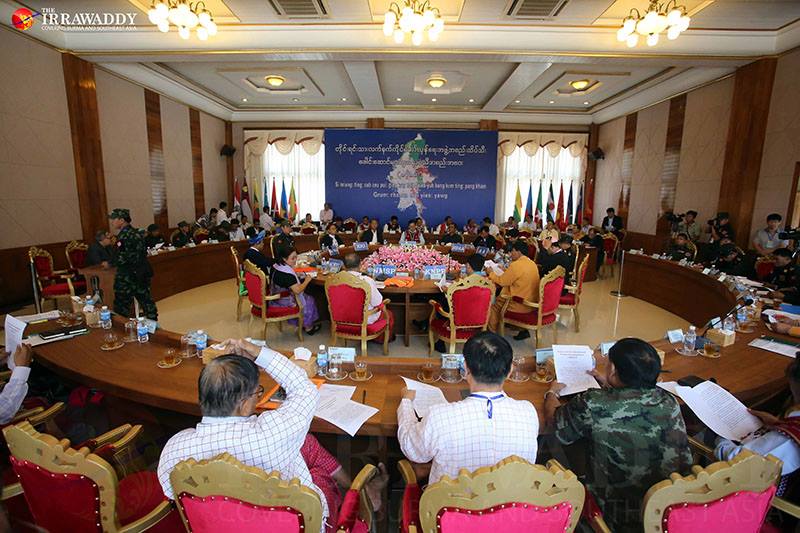 As the ethnic armed groups’ summit in Panghsang, Shan State concluded on 6 May 2015, familiar obstacles still loom large in the peace process. Namely, the 2008 Constitution, continued attacks and human rights violations committed by the Burma Army, and a lack of trust. Various commentators and organizations, including Burma Partnership, sounded words of caution after the over excitement caused by the agreement in principle of the draft nationwide ceasefire agreement (NCA), and those words of caution are salient today as peace remains out of sight.
As the ethnic armed groups’ summit in Panghsang, Shan State concluded on 6 May 2015, familiar obstacles still loom large in the peace process. Namely, the 2008 Constitution, continued attacks and human rights violations committed by the Burma Army, and a lack of trust. Various commentators and organizations, including Burma Partnership, sounded words of caution after the over excitement caused by the agreement in principle of the draft nationwide ceasefire agreement (NCA), and those words of caution are salient today as peace remains out of sight.
The summit in Panghsang, territory controlled by the United Wa State Army (UWSA), brought together 12 major ethnic armed groups for talks that lasted six days. Groups that were present included those bearing the brunt of Burma Army offensives the past few weeks, the Kachin Independence Organization (KIO), the Ta’ang National Liberation Army (TNLA), the Arakan Army (AA), and the Myanmar National Democratic Alliance Army (MNDAA). In fact, as talks were being held, the Burma Army attacked Kachin Independence Army (KIA) positions with airstrikes. It is not just the armed groups themselves who are bearing the brunt of attacks, but horrific human rights violations committed by the Burma Army on fleeing ethnic Kokang villagers, such as extrajudicial killings, including beheadings, are creating deep-seated fear among those who have been displaced by the conflict, but who are being pressured to return by Burma authorities […]
• • •The Ethnic Armed Organizations’ Summit In Panghsang Addressed Key Issues In The Nationwide Ceasefire Agreement Draft
The Ethnic Armed Organizations Leaders Summit attended by a total of 65 leaders and observers from 12 Ethnic Armed Organizations (EAOs) was successfully held in Panghsang, the capital of the Wa special region of Northern Shan State on 1-6 May 2015 […]
• • •Outcome Statement of senior officials Workshop on UN Security Council Resolution 1325 on Women, Peace and Security and Related Resolutions
The Myanmar National Human Rights Commission (MNHRC) and UN Women, Myanmar organized a Workshop on UN Security Council Resolution, 1325 ( UNSCR 1325) on Women, Peace and Security, and related Resolutions in Nay Pyi Taw on 27-28 April 2015. The meeting brought together 41 participants – parliamentarians, senior government officials from ministries addressing women, peace and security issues, commissioners and staff of MNHRC and academics […]
• • •Burma’s NCA Takes Another Chaotic Turn
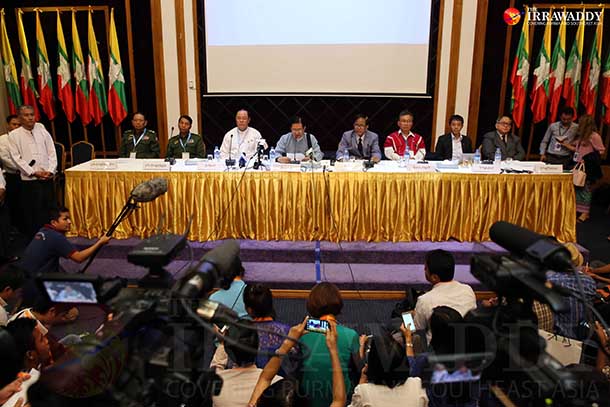 On 31 March, 2015, a signing ceremony took place in Rangoon involving members of the Nationwide Ceasefire Coordination Team (NCCT) and the Union Peace Working Committee (UPWC), and observed by President Thein Sein. Contrary to initial fervour around this event, this was not the actual signing of the nationwide ceasefire agreement (NCA). Rather, it was to agree in principle to a draft text that may be signed in the future. Many more difficult negotiations and hard compromises are still to happen. The next step, and this is not an insignificant rubber stamp of approval, is for the ethnic representatives to take this draft back to their respective organizations and alliances such as the United Nationalities Federal Council (UNFC), for discussions and decisions to be made as to whether this draft text of the NCA will be signed. This may well be made at a conference of ethnic armed groups (EAGs) towards the end of April.
On 31 March, 2015, a signing ceremony took place in Rangoon involving members of the Nationwide Ceasefire Coordination Team (NCCT) and the Union Peace Working Committee (UPWC), and observed by President Thein Sein. Contrary to initial fervour around this event, this was not the actual signing of the nationwide ceasefire agreement (NCA). Rather, it was to agree in principle to a draft text that may be signed in the future. Many more difficult negotiations and hard compromises are still to happen. The next step, and this is not an insignificant rubber stamp of approval, is for the ethnic representatives to take this draft back to their respective organizations and alliances such as the United Nationalities Federal Council (UNFC), for discussions and decisions to be made as to whether this draft text of the NCA will be signed. This may well be made at a conference of ethnic armed groups (EAGs) towards the end of April.
The instant headlines around this event were misleading, and international actors were indeed, misled. The UN Special Advisor for Myanmar, Vijay Nambiar, called the event “a historic and significant achievement” while the European Union said the agreement “bears testimony to the political courage and commitment of all sides to resolve grievances through dialogue rather than armed conflict.” Domestically, however, this praise was not reciprocated, as many Burmese political commentators and civil society criticized the signing on social media. This is hardly surprising because as of yet, key issues have been delayed and pushed back for later talks. These issues include a code of conduct, a monitoring mechanism for the ceasefire, interim arrangements before political dialogue begins, disarmament, demobilization, and reintegration (DDR), and security sector reform (SSR).
• • •Nationwide Ceasefire Agreement Unlikely in April
On 31 March, the Nationwide Ceasefire Coordination Team (NCCT) and the Union Peacemaking Work Committee (UPWC) finalized the draft of the Nationwide Ceasefire Agreement (NCA), which comprises seven chapters and thirty-three sections. China, the UN, and other armed resistance organizations such as the Restoration Council of Shan State, All Burma Students Democratic Front, and Nationalist Socialist Council of Nagaland-Khaplang observed the latest round of the talks in Rangoon.
• • •Time for Honesty Around Peace and Conflict
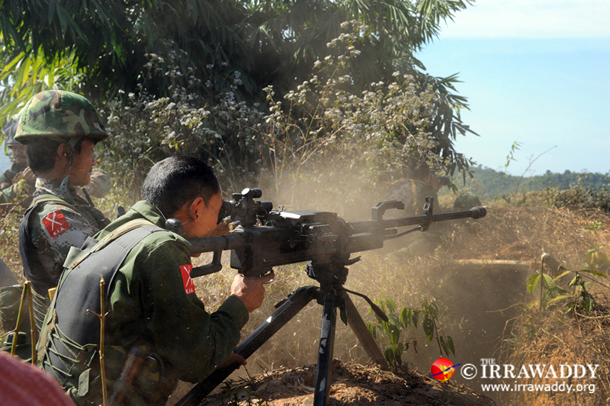 Peace talks resumed after a six month hiatus between the Burma Governments’ Union Peace-making Work Committee (UPWC) and the alliance of ethnic armed groups, the Nationwide Ceasefire Coordination Team (NCCT). Yet in an extraordinary display of hypocrisy, the Burma Army began airstrikes again against the Kachin Independence Army (KIA), just as the talks paused for a week-long break. This is to complement the airstrikes currently targeting the Myanmar National Democratic Alliance Army (MNDAA) in northern Shan State.
Peace talks resumed after a six month hiatus between the Burma Governments’ Union Peace-making Work Committee (UPWC) and the alliance of ethnic armed groups, the Nationwide Ceasefire Coordination Team (NCCT). Yet in an extraordinary display of hypocrisy, the Burma Army began airstrikes again against the Kachin Independence Army (KIA), just as the talks paused for a week-long break. This is to complement the airstrikes currently targeting the Myanmar National Democratic Alliance Army (MNDAA) in northern Shan State.
The Burma Government, through its proxies the UPWC and the Myanmar Peace Center, consistently attempts to dominate the discourse surrounding the peace talks, eschewing positive conclusions whenever talks happen. Time and time again the media is told that the signing of a nationwide ceasefire accord (NCA) is ‘just round the corner,’ or in this case, ‘within days.’ How can the signing of the NCA be within days if the Burma Army has opened two fronts on its war against ethnic armed groups? Furthermore, although the MNDAA is part of the NCCT, they have been excluded from the most recent peace talks, with the Government and the Burma Army steadfastly refusing to consider any method of engagement with them apart from through military means. There needs to be honesty from the government on the realities of the prospects for peace so that parties concerned, including the donors and civil society, are able to contribute and help steer the process instead of losing trust in it […]
• • •








 All posts
All posts